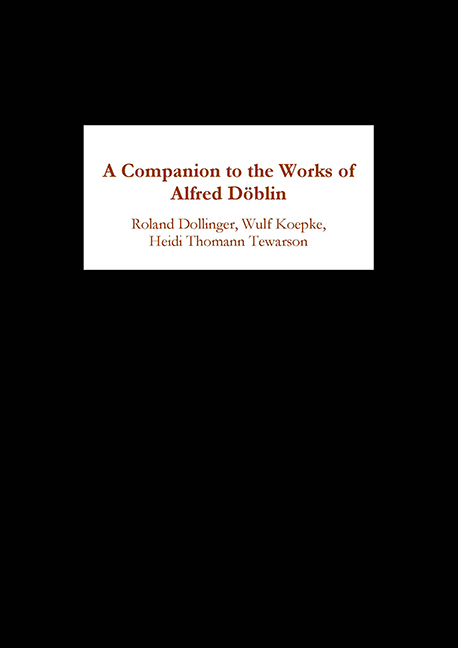Book contents
- Frontmatter
- Contents
- Foreword
- Abbreviations and Translations of Titles
- Works by Alfred Döblin
- Introduction
- Early Works
- Works of the Weimar Period
- The Fall of Wallenstein, or the Collapse of Narration? The Paradox of Epic Intensity in Döblin's Wallenstein
- Technology and Nature: From Döblin's Berge Meere und Giganten to a Philosophy of Nature
- “Arzt und Dichter”: Döblin's Medical, Psychiatric, and Psychoanalytical Work
- Döblin's Berlin: The Story of Franz Biberkopf
- Döblin's Engagement with the New Media: Film, Radio and Photography
- Döblin's Political Writings during the Weimar Republic
- Exile and Return to Europe
- Bibliography
- Notes on the Contributors
- Index
Döblin's Political Writings during the Weimar Republic
from Works of the Weimar Period
Published online by Cambridge University Press: 27 April 2017
- Frontmatter
- Contents
- Foreword
- Abbreviations and Translations of Titles
- Works by Alfred Döblin
- Introduction
- Early Works
- Works of the Weimar Period
- The Fall of Wallenstein, or the Collapse of Narration? The Paradox of Epic Intensity in Döblin's Wallenstein
- Technology and Nature: From Döblin's Berge Meere und Giganten to a Philosophy of Nature
- “Arzt und Dichter”: Döblin's Medical, Psychiatric, and Psychoanalytical Work
- Döblin's Berlin: The Story of Franz Biberkopf
- Döblin's Engagement with the New Media: Film, Radio and Photography
- Döblin's Political Writings during the Weimar Republic
- Exile and Return to Europe
- Bibliography
- Notes on the Contributors
- Index
Summary
Döblin’s intense involvement in a wide range of social and political issues during the years from 1918 to 1933 is documented by a wealth of contributions to journals, newspapers, and radio programs. He wrote autobiographical sketches, eyewitness accounts of social and cultural events, commentaries on his works, theater and book reviews, essays on literature and aesthetics, and articles on matters of public health. But above all, Döblin voiced his opinions in political commentaries, very personal and often rambling, and always with an unmistakable sarcastic and witty tone, that he called “Glossen.” It is this humorous, satirical perspective that typified both Döblin's own political attitude and that of other intellectuals during these years, among them Kurt Tucholsky (1890–1935) and Erich Kästner (1899–1974). One might say that Döblin, while coming from the tradition of the feuilleton and staying close to the witty and deflating style favored by Berlin writers and cabarets, invented his own genre, the “Glosse.” It typically mixed firsthand accounts of current happenings with very personal reflections and associations. This associative style switched back and forth between cultural events and street scenes, between comments on the government and the economy, and always sprinkled this discursive mixture with moral reflections. However, while the writer clearly upheld basic values such as honesty, responsibility, and solidarity, and chastised hypocrisy, greed, and selfishness, it is not always possible to pin him down to a clearly defined political position within the context of Weimar politics. He remained an unpredictable free spirit. Many of his contemporaries and a good number of later critics rebuked him for his nonpartisanship (Müller-Salget, 249–59, Sebald). The political dimension of Döblin's writings still awaits a detailed analysis in order to assess its place in the context of his entire oeuvre and its relation to the political thinking of other Weimar writers.
The First World War had been a watershed for most German intellectuals with regard to their attitudes toward society and politics. They realized that they could no longer afford the luxury of withdrawing into the ivory tower, to ignore the events of the day and leave politics to the politicians. They had to get involved socially and politically. The loud patriotism of 1914 had been a first spontaneous and unconsidered expression of political engagement.
- Type
- Chapter
- Information
- A Companion to the Works of Alfred Döblin , pp. 183 - 192Publisher: Boydell & BrewerPrint publication year: 2003



